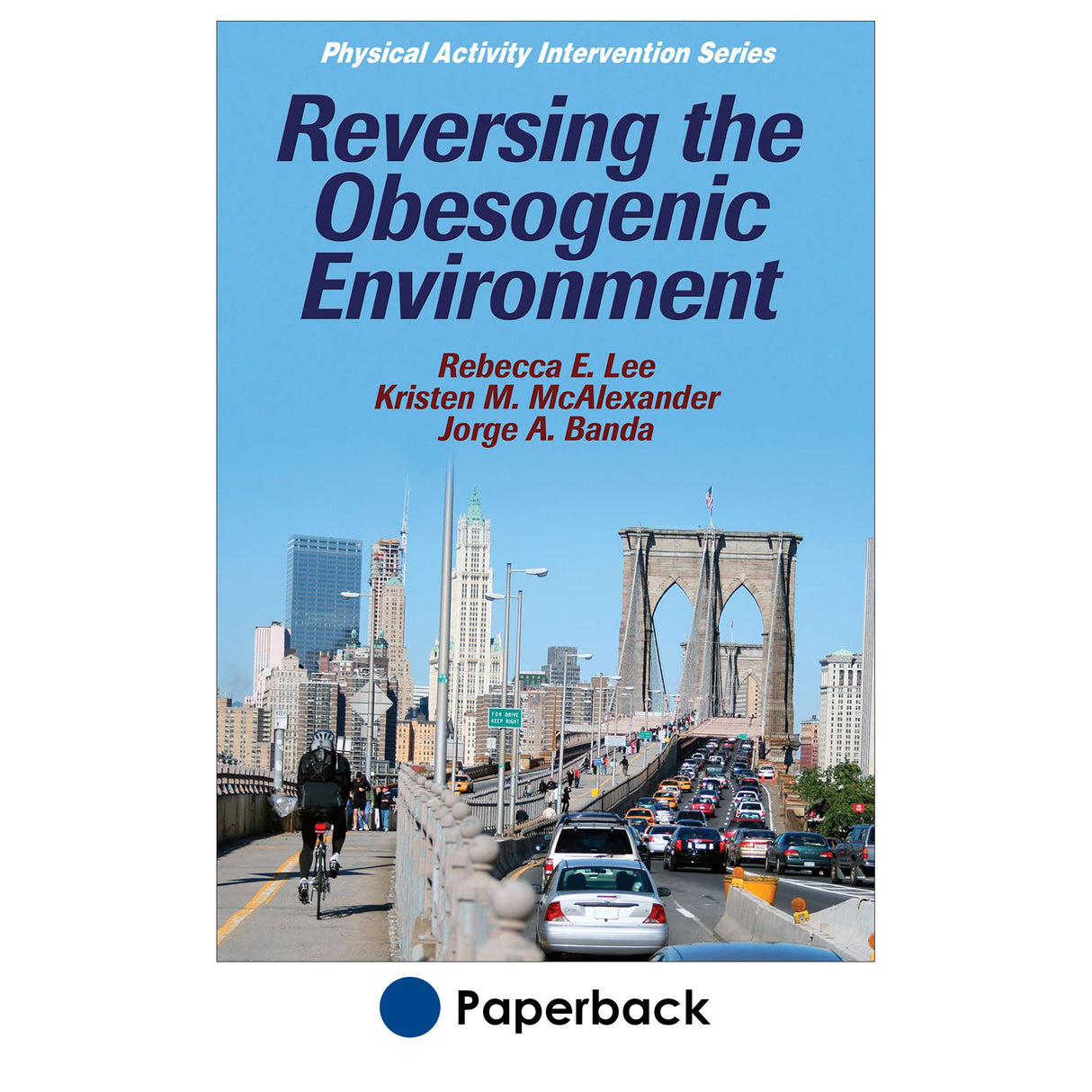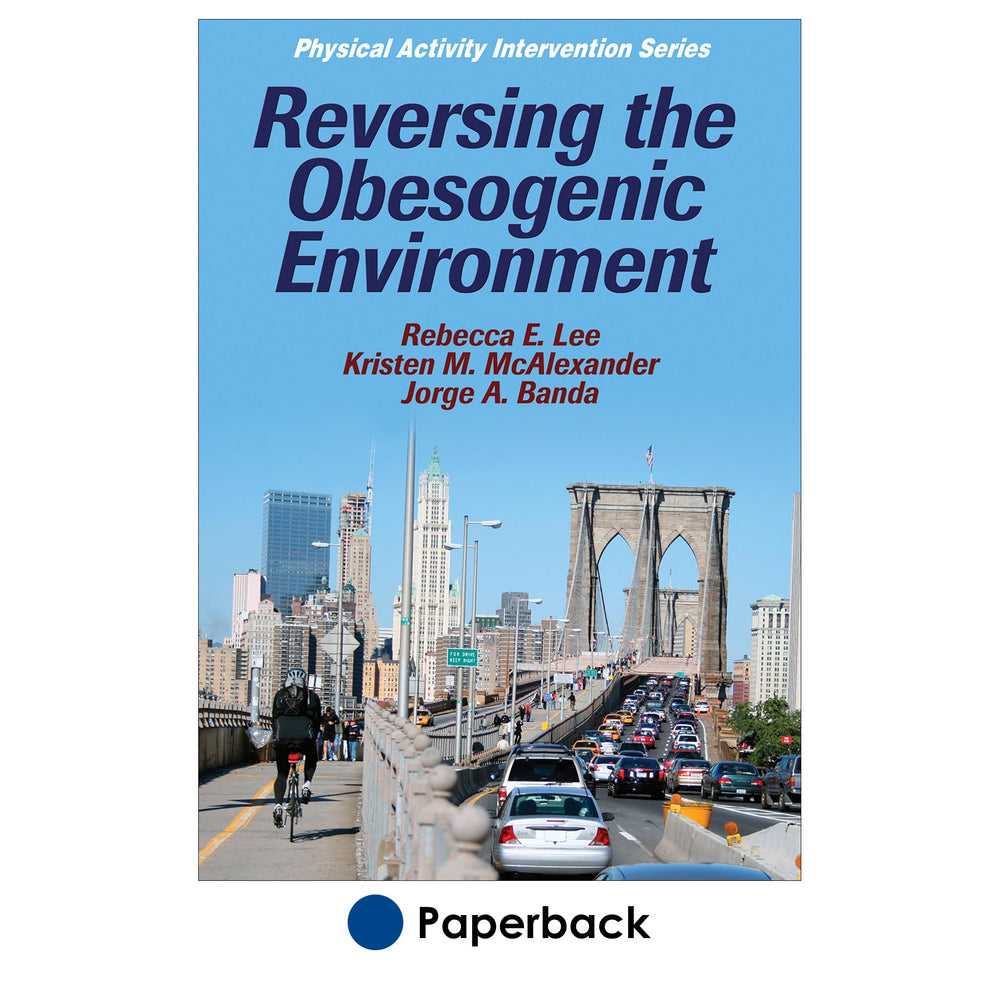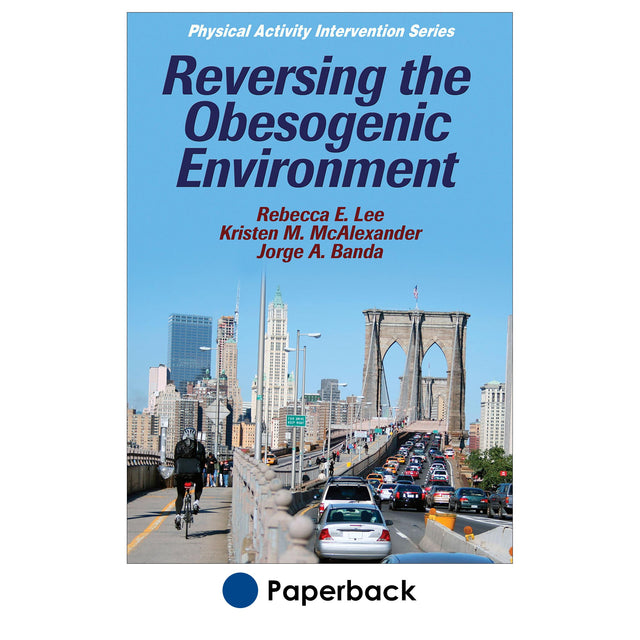Reversing the Obesogenic Environment
$59.00 USD
Obesity has become a global crisis. Although most would agree that eating better and being more physically active are the answer to the problem, researchers have recently become aware that the problem goes beyond just changing individual behaviors. We can convince people of the benefits of healthful eating and regular physical activity, but what happens when they go home to a neighborhood where fresh vegetables are not available and opportunities for physical activity are hard to find? If the environment doesn’t help support healthy lifestyles, the change will be next to impossible to sustain. In Reversing the Obesogenic Environment, leading researchers Lee, McAlexander, and Banda introduce the concept of the obesogenic environment—an environment that leads people to become obese—and explore ways that changing our environment can encourage healthier choices.
Although most of the current literature focuses on the food supply and dietary habits, Reversing the ObesogenicEnvironment takes a broader view of the current obesity problem. It looks at all of the elements that combine to create the obesogenic environment:
•The ways that the built environment, access to resources, and active transportation systems can either foster or discourage regular physical activity
•The multiple factors that encourage consumption of calorie-laden, nutritionally inadequate foods that can lead to obesity
•The positive and negative impact of public policy
•The influence of family, culture, socioeconomic status, and other social factors on an individual’s health behaviors as well as access to physical activity opportunities and healthier food options
•The role that media and marketing play in food purchasing decisions
With Reversing the Obesogenic Environment, readers will get a cutting-edge view of this emerging body of research with applications that can be realistically implemented in their communities. The book goes beyond defining the issues that contribute to the obesity epidemic—it offers tools that will help practitioners start to reverse it. Throughout the book, the authors incorporate practical recommendations based on the latest research. Sample programs and policies, checklists, and potential solutions offer readers a starting point for changes in their own communities.
The obesity epidemic is a multifaceted issue influenced by factors ranging from international trade and national policy to individual behaviors. Reversing the problem will take coordinated multilevel efforts. These efforts may take years to come to fruition, but it isn’t too late to take action. Reversing the Obesogenic Environment is the ideal guide to taking the first steps toward change.
Reversing the Obesogenic Environment is part of the Physical Activity Intervention Series (PAIS). This timely series provides educational resources for professionals interested in promoting and implementing physical activity and health promotion programs to a diverse and often-resistant population.
Audience
A reference for public health officials, epidemiologists, health and fitness professionals, or others interested in the environmental factors contributing to obesity; also a textbook for upper-level undergraduate or graduate courses in health promotion, public health, epidemiology, wellness, or obesity.
Part I: Public Health and Obesity
Chapter 1: Emergence of the Obesogenic Environment
Historical Emergence of Obesity as a Public Health Concern
The Case for an Obesogenic Environment
Ecologic Models of Health and the Importance of Supportive Environments
Summary
Chapter 2: Scope of Obesity
Obesity Defined
Causes of Obesity
Vulnerable Populations
Health Risks Associated With Overweight and Obesity
Social and Psychological Costs of Obesity
Summary
Chapter 3: Body Composition Measurements
Field Methods
Laboratory Methods
Summary
Part II: Physical Activity and Obesity
Chapter 4: The Built Environment
Components of the Built Environment
Measuring the Built Environment
Limitations of Research on the Built Environment
Neighborhood Walkability and Physical Activity
Emerging Research and Recommendations
Summary
Chapter 5: Physical Activity Resources
Parks and Open Spaces
Walking Trails and Bikeways
Home Environment
Factors Influencing the Use of Physical Activity Resources
Measuring Physical Activity Resources
Emerging Research and Implications for the Future
Summary
Chapter 6: Active Transportation
Personal Automobile and Obesity
Walkability
Public Transportation
Active Transport to School
Stair Use
Summary
Part III: Food Accessibility
Chapter 7: Food Supply and Security
Nutrition Transition
Food Production
Imports and Exports
Food Storage
Nutritional Disparities, Obesity, and Undernutrition
Food Security
Government intervention
Supplemental Nutrition Assistance Program
Summary
Chapter 8: Food Technology
Genetic Engineering
Trans-Fatty Acids
Factory Farming
Summary
Part IV: Public Policy, Sociocultural Influences, and Obesity
Chapter 9: Policy and Individual Health Choices
Levels of Preventions
Guidelines
Educating Individuals
Regulations at the Point of Purchase
Incentives for Good Behavior
Other Approaches
Summary
Chapter 10: Policy and the Obesogenic Environment
Agriculture
International Trade
Food Industry and Food Environments
Built Environment
Transportation
Schools
Worksites
Summary
Chapter 11: Cultural and Familial Influences
Family Culture Within the Ecologic Model of Obesity
Cultural Influences
Familial Influences
Summary
Chapter 12: Social Justice, Health Disparities, and Obesity
Socioeconomic Status
SES, Social Injustices, Health Behaviors, and Obesity
Weight Discrimination
Resiliency to Social Injustices
Solutions
Summary
Part V: Media and Marketing
Chapter 13: Point of Purchase
Marketing, Advertising, Branding
The Four Ps
Summary
Chapter 14: Influence of Media and Technology
Biological Responses to Food Images
Television Advertising and Children
Internet Advertising
Billboard Advertising
Sports Sponsorships
Media Interventions Strategies
Summary
Excessive TV viewing and TV ads contribute to serious health problems among youth
Modern lifestyles, environments play large role in obesity epidemic
Is The Environment Causing Obesity? Taking Action To Reverse An Epidemic





